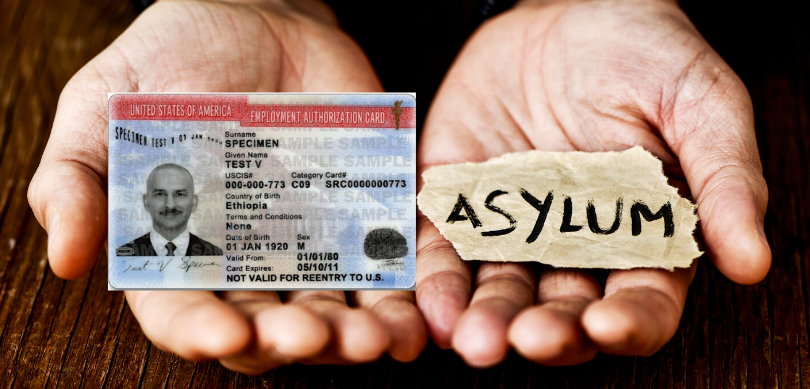Are there work visas for Social Media Influencers?
Kris Quadros-Ragar • June 22, 2023
The answer is: YES!
Social media influencers and content producers with a large online following can qualify for an O-1 temporary work visa or an EB-1 green card, often referred to as "talent visas" or "extraordinary ability green cards."
IThe role of social media influencers has gained significant importance in recent years, becoming a crucial element in the marketing strategies of companies and organizations worldwide. With a total market opportunity exceeding $14 billion across various social media platforms, there is a wealth of job opportunities available for social media influencers. In recognition of their growing influence and demand, U.S. immigration policy has begun acknowledging social media influencers as a legitimate profession, making them eligible for temporary work visas and green cards.
One way to prove that you're an exceptional social media influencer is by showing evidence of the brand deals you've been a part of. The more famous and respected the companies are, the better it is for your case. But even if you've worked with smaller companies, it still counts if you've earned a good amount of money. Your audience size, visibility, and number of followers also matter because they demonstrate your influence and earning potential through your following.
The O-1B Nonimmigrant Visa Route: To apply for the O-1B nonimmigrant visa, a temporary work visa, you must have a job offer or an agent in the United States who will act as your sponsor. Agents can be individuals or companies that will represent you in various projects and brand deals you will be involved in within the United States. In addition to filing the O-1B application, you must provide supporting documentation, which typically includes deal memos, contracts, and proof that you will continue to be involved in projects and similar opportunities throughout your stay.
The EB-1A Route:
The EB-1A route provides a more permanent option for social media influencers interested in living and working in the United States. Unlike the O-1B visa, the EB-1A visa allows the applicant to obtain permanent residency in the U.S., commonly known as a green card. As a result, the EB-1A category carries a much higher "extraordinary ability" standard than the O-1B visa. Therefore, it's important for applicants to consult with an experienced attorney to evaluate their experience and accomplishments before applying for an EB-1A.
Whether you're considering an O-1B Visa or an EB-1A Visa, you must be prepared to gather important documentation to support your application. This includes evidence of high earnings from previous work, proof of collaborations with renowned brands and organizations, documentation of your active participation in prestigious events, media coverage highlighting your accomplishments, any awards you have received, and recommendation letters from other respected social media influencers or notable figures in your industry. These documents play a vital role in strengthening your visa application and demonstrating your qualifications and achievements.
Please note that social media influencers who come to the United States on a tourist visa (known as the B1/B2 visa) and engage in activities strictly prohibited by that visa type may face serious consequences if the information becomes known to immigration, such as potential barring from the United States and other major repercussions upon re-entry. For this reason, it is crucial for social media influencers to consult with an experienced immigration attorney to help them navigate the visa process and find the right visa classification.
If you believe you may qualify for either of these visas you should contact our office.
This blog is not intended to be legal advice and nothing here should be construed as establishing an attorney client relationship. Please schedule a consultation with an immigration attorney before acting on any information read here.
This Facebook widget is no longer supported.
Kris Quadros-Ragar
Similar Posts

What is E-Verify+? E-Verify+ is the newest version of E-Verify, a system run by the U.S. Department of Homeland Security (DHS) to help employers confirm the work eligibility of their employees. Effective October 21, 2024, E-Verify+ includes new features designed to streamline the employment verification process and ensure more accurate, secure results for both employers and employees. The E-Verify system checks a person’s work eligibility by comparing information from their Form I-9 (Employment Eligibility Verification) with records from DHS and the Social Security Administration (SSA). E-Verify+ takes this process further with enhanced capabilities and updated features, which make verification faster, more reliable, and more user-friendly. What’s New in E-Verify+? Automated Work Authorization Extensions For employees who are renewing work authorization, E-Verify+ can now provide automatic updates if the renewal process is delayed. This minimizes disruptions for both employers and employees, ensuring that work authorization continues as long as the renewal is in process. Enhanced Accuracy with Biometric Verification One of the key updates in E-Verify+ is biometric verification, which uses fingerprints or other biometrics to confirm an employee’s identity more accurately. This feature is expected to reduce identity theft and improve the reliability of work authorization checks. Simplified Case Management System E-Verify+ includes an updated case management system that allows employers to resolve discrepancies and update information more efficiently. For instance, if there is a mismatch between an employee’s Form I-9 and government records, E-Verify+ will guide employers on next steps to quickly address the issue. Integration with EAD (Employment Authorization Document) Updates Employees applying for Employment Authorization Documents (EAD) will find that E-Verify+ now includes an integration feature that tracks the status of EAD renewals and provides employers with updates on pending applications. What Does This Mean for Employers? With E-Verify+, employers benefit from a more efficient and reliable employment verification process. Employers who participate in E-Verify+ are better equipped to avoid penalties for hiring unauthorized workers while also reducing administrative burdens associated with verification. The system’s enhanced automation helps streamline the hiring process, which can save time and resources for businesses. What Does This Mean for Employees? For employees, E-Verify+ provides greater security and transparency. Automated work authorization extensions can help prevent employment gaps due to delays in authorization processing, which is especially important for those relying on renewals. Additionally, the use of biometrics means employees can be assured that their personal identity is protected during verification. If you want to find out more about E-Verify or want to better understand the employment verification process, please contact one of our experienced Immigration Attorneys!

The answer to the question above is, depending on your circumstances, yes! USCIS has established very clear criteria for when a request to expedite a pending travel permit application can be made. These criteria include: Severe financial loss to a company or person, provided that the need for urgent action is not the result of the petitioner’s or applicant’s failure to: Timely file the benefit request, or Timely respond to any requests for additional evidence; A company can demonstrate that it would suffer a severe financial loss if it is at risk of failing, losing a critical contract, or having to lay off other employees. For example, a medical office may suffer severe financial loss if a gap in a doctor’s employment authorization would require the medical practice to lay off its medical assistants. Job loss may be sufficient to establish severe financial loss for a person, depending on the individual circumstances. For example, the inability to travel for work that would result in job loss might warrant expedited treatment. The need to obtain employment authorization by itself, without evidence of other compelling factors, does not warrant expedited treatment. In addition, severe financial loss may also be established where failure to expedite would result in a loss of critical public benefits or services. Emergencies and urgent humanitarian reasons; In the context of an expedite request, humanitarian reasons are those related to human welfare. Examples may include, but are not limited to, illness, disability, extreme living conditions, death in the family, or a critical need to travel to obtain medical treatment in a limited amount of time. An emergency may include an urgent need to expedite employment authorization for healthcare workers during a national emergency such as the COVID-19 pandemic. Nonprofit organization (as designated by the Internal Revenue Service) whose request is in furtherance of the cultural or social interests of the United States; A nonprofit organization seeking to expedite a beneficiary’s benefit request must demonstrate an urgent need to expedite the case based on the beneficiary’s specific role within the nonprofit in furthering cultural or social interests (as opposed to the organization’s role in furthering social or cultural interests). Examples may include a medical professional urgently needed for medical research related to a specific social U.S. interest (such as the COVID-19 pandemic or other socially impactful research or project) or a university professor urgently needed to participate in a specific and imminent cultural program. Another example is a religious organization that urgently needs a beneficiary’s specific services and skill set to continue a vital social outreach program. U.S. government interests (such cases identified as urgent by federal agencies such as the U.S. Department of Defense, U.S. Department of Labor, National Labor Relations Board, Equal Opportunity Commission, U.S. Department of Justice, U.S. Department of State, U.S. Department of Homeland Security, or other public safety or national security interests); or U.S. government interests may include, but are not limited to, cases identified as urgent by other government agencies, including labor and employment agencies, and public safety or national security interests. Clear USCIS error. Not every circumstance that fits in one of these categories will result in expedited processing; expedite requests are discretionary, highly subjective and never guaranteed. Expedite requests are initiated by calling the USCIS contact center and providing your case Receipt Number and reasons for the request. The approximate processing time for an expedite request is 7-10 business days. When you call to request expedited processing, the USCIS Contact Center creates and forwards a service request to the office with jurisdiction over your application or petition. After receiving the service request, the reviewing office may request additional documentation to support expedited processing. A decision on an expedite request is not an approval or a denial of the underlying benefit request. The expedite decision simply informs the requestor whether USCIS will take the benefit request out of date order and issue a decision (approval or denial) faster than the normal processing time.

In years past, spouses of certain E and L visa categories were required to apply for and receive an Employment Authorization Document in order to work in the United States. However, as the result of a settlement reached by USCIS in the class action lawsuit Shergill v. Mayorkas on November 10, 2021, USCIS now considers E and L dependent spouses to be authorized for employment incident to their status.

The federal government entered a partial shutdown on January 31, 2026, after Congress failed to pass a final funding package. While this follows the record-breaking 43-day shutdown from last fall, this disruption is expected to be brief, with a House vote anticipated for the first week of February. However, as of February 2, several key departments are operating under shutdown contingencies. If you are an employer or a foreign national, here is what you need to know about how this affects your immigration matters: Impacts for Employers Certified LCAs: The Department of Labor (DOL) has suspended the processing of Labor Condition Applications. This means employers cannot currently obtain the certifications required to file new H-1B, H-1B1, or E-3 petitions. PERM and Prevailing Wages: Processing for PERM labor certifications and prevailing wage determinations has halted. This will likely cause a backlog once the government reopens. E-Verify: The E-Verify system is typically taken offline during a shutdown. Employers should continue to follow I-9 requirements but may be unable to resolve Tentative Nonconfirmations (TNCs) until the system is restored. Impacts for Employees and Families Consular Services: While U.S. embassies and consulates are fee-funded, their operations may be reduced. If you have an upcoming visa interview, check the specific consulate's website for status updates, as delays are possible. USCIS Operations: Because USCIS is primarily funded by application fees, it remains open. You should still attend scheduled interviews and biometrics appointments unless notified otherwise. CBP and Travel: U.S. Customs and Border Protection (CBP) functions are essential. Ports of entry remain open, though you may experience longer waiting times due to staffing adjustments. At Santos Lloyd, we are closely monitoring the situation as it unfolds. Whether you are an employer seeking guidance on how this shutdown impacts your hiring plans or an employee with general questions regarding if or how you may be affected, please reach out to our office. We remain dedicated to providing the updates and professional assistance necessary to help you navigate these disruptions.

U.S. Citizenship and Immigration Services (USCIS) has announced a major change to the H-1B cap selection process. Under a final rule issued on December 29, 2025, USCIS will replace the long-standing random H-1B lottery with a wage-weighted selection system that favors higher-paid and more complex positions. The rule is scheduled to take effect on February 27, 2026 , just ahead of the fiscal year 2027 H-1B cap registration season, unless delayed by legal challenges. If implemented, USCIS is expected to release additional guidance explaining how employers must submit registrations under the revised process. This change marks one of the most significant reforms to the H-1B program in recent years. Up until 2025, all registrations were treated equally once the annual cap was reached. Under the new system, selection odds will be tied to wage levels based on the U.S. Department of Labor’s Occupational Employment and Wage Statistics data. All H-1B registrations will still be placed into a single selection pool, but registrations tied to higher wage levels will receive multiple entries into that pool, increasing their likelihood of selection. Lower wage levels will receive fewer entries, making selection less likely but not impossible. H-1B wage levels are not determined solely by salary. Each wage level reflects the complexity of the job, the level of responsibility involved, and the education and experience required . Entry-level positions involving routine duties and close supervision are generally classified at the lowest wage level, while positions requiring independent judgment, advanced skills, and significant responsibility fall into higher wage levels. The highest wage level is reserved for roles that involve expert knowledge, strategic decision-making, and substantial leadership or technical authority. USCIS is expected to closely scrutinize selected petitions to ensure that the wage level claimed during registration is supported by the job duties and salary offered in the petition. Any discrepancies between the registration and the petition may result in requests for evidence, denials, or enforcement action. With the elimination of the purely random lottery, employers should begin preparing early by carefully evaluating job descriptions, wage levels, and overall H-1B strategy. Accurate classification and thoughtful planning will be essential under this new wage-based selection system. If you are an employer considering H-1B sponsorship, or a foreign professional wondering whether your position may qualify under the new wage-based system, consulting with experienced immigration counsel is more important than ever. Santos Lloyd Law is actively advising clients on H-1B cap registrations and strategy under the new rules. To discuss your options or determine whether you may qualify, contact our office to schedule a consultation.

During the recent administration there has been an increase in issuance of Requests for Evidence for EB-1A petitions for those of Extraordinary Ability. A Request for Evidence is a request that is made by USCIS that should explain how the evidence is deficient in proving the criteria argued and what additional evidence needs to be provided by the applicant to meet the criteria. EB-1A petitions are already normally subject to higher scrutiny because their approval is the first step needed to apply for Lawful Permanent Residence or a green card. USCIS normally requires not just evidence but that the evidence be provided with context and information to show why it matters in a particular field. For example, if you were providing evidence of your membership in an organization that requires outstanding achievements of its members, just providing evidence of the membership is not enough. You must explain what that membership is and provide background information on the organization granting the membership. You also need to provide evidence on the criteria that is used to select the members, information on those who select the members to show that they are recognized experts, other documentation such as articles about the membership organization to show its importance, and any other relevant evidence and background information to show that the criteria is met. A request for evidence being issued prior to the current administration was not uncommon, but in the current climate it is more surprising to not receive a request for evidence for this type of case. It is important to remember that a request for evidence is not a denial. Depending on the validity of the information in the request and the substance some Requests for Evidence can be overcome, and the case be approved. It is important to carefully review the request and note if there are any errors in the content and application of the regulations by USCIS. If you have an attorney, you should work with them and make sure that you provide any evidence you think may be helpful. Although there is a deadline by which a response must be submitted, attention to detail and patience will go a long way when dealing with having to respond to a request for evidence. If you believe you may qualify for this type of visa, please feel free to contact our office.




